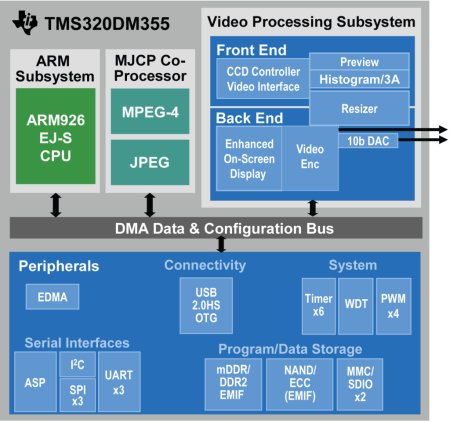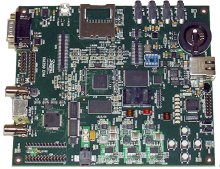Linux SDK supports sub-$10 HD-video SoC
Oct 22, 2007 — by Eric Brown — from the LinuxDevices Archive — 11 viewsRidgeRun has introduced a Linux-based SDK (software development kit) for Texas Instruments's sub-$10 TMS320DM355 digital video SoC (system-on-chip). The SDK is intended to jump-start the development of cost-constrained, battery-powered devices with multimedia requirements such as high-definition video.
A member of TI's DaVinci family of digital-video subsystem processors, the power-sipping DM355 SoC targets a variety of battery-powered video applications, from video security systems to video doorbells to digital still cameras. The SoC combines an ARM9-based embedded processor with an integrated HD-video encoder, and is said to enable double the battery life of today's HD-video device chipsets — only 400mW during 720p MPEG-4 encoding, and 1mW on standby.

DM355 SoC block diagram
RidgeRun touts its DM355 SDK's easy configuration and says it provides a small footprint that fits on 2MB of flash and pre-integrates a variety of open source applications.
 TI's DM355 DVEM reference design (Click to enlarge) |
RidgeRun's SDK is available in two versions. A free version supports the functionality implemented on TI's DM355 Digital Video Evaluation Module (DVEM) reference design (pictured on the right), while a paid “developer's version” — with additional features and support — is aimed at projects and applications requiring more extensive customization.
Both versions — the free SDK, and the developer's SDK — include features such as a GCC 4.1 with soft-float ARM processor support and a choice of uClibc- or glibc-based toolchains.
Touted features of both versions of RidgeRun's new DM355 SDK include:
- Panel-driven build tool
- Many pre-integrated open source applications
- Small footprint, minimal compressed system that fits on 2MB of flash
- RidgeRun bootloader: rrload (most platforms)
- Linux 2.6 kernel with real-time patches (Currently Linux 2.6.22)
- GCC 4.1 with soft-float ARM processor support
- uClibc- or glibc-based toolchain
- NPTL thread library
- EABI support on ARM targets
- gdbserver and gdb for system debugging
Additional features available in the developer's version of the SDK are said to include:
- 60-hour support contract
- Profiler tool for system profiling
- Support for target file systems, including initrd, cramfs, romfs, JFFS2, and NFS
- Open OCD script generation
- Sample programs for AIC, I2C, and SPI devices
- Dual-boot or backup-partition aids
- Power management for RidgeRun-supported drivers
Further information on the DM355 SoC is available on TI's website, here. In particular, an informative TI newsletter on the DM355 is available here (PDF download).
After closing its doors in 2002, Eden Prairie, Minn.-based RideRun relaunched in July of 2006 with its focus remaining on providing embedded Linux support for TI's ARM-based processors and chipsets. Drawing on core talent from the old RidgeRun, the company says its engineering team is now primarily based in Costa Rica.
Availability
RidgeRun's SDKs for TI's DM355 SoC and DEVM appear to be available now. Pricing for the developer's version was not disclosed. The company said it also plans to release a GUI SDK, media bundle, and reference applications for the DM355.
This article was originally published on LinuxDevices.com and has been donated to the open source community by QuinStreet Inc. Please visit LinuxToday.com for up-to-date news and articles about Linux and open source.